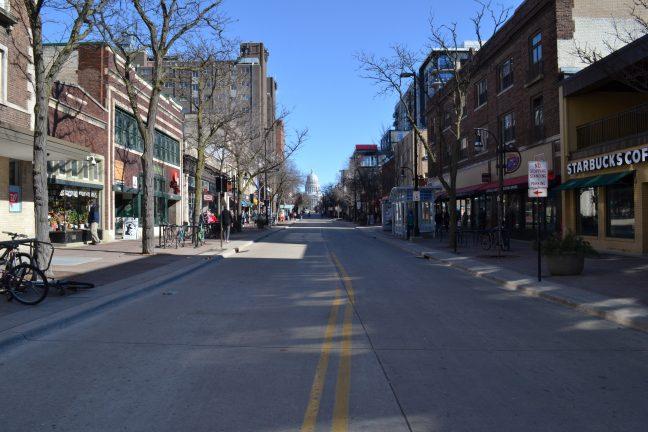As Madison restaurants continue adjusting to daily operational challenges caused by pandemic-related restrictions, many businesses on and around State Street are adopting unique arrangements in preparation for the upcoming winter season.
Bassett Street Brunch Club shift lead Sydney Thompson said it’s been tough for local restaurants.
“Our business is doing okay right now as we’ve been able to manage on a lot of to-go orders, but we are only open to 25% capacity and we only have outdoor seating,” Thompson said.
According to Madison Magazine, many restaurants on State Street are now offering outdoor seating in order to comply with public health regulations.
As with most local establishments, sanitation and employee attire changed at Bassett Street in order to meet the new guidelines and needs of the public.
They are using proper personal protective equipment, including masks, gloves and sanitizer, Thompson said.
“We’ve switched where we put our checks and have placed them in cups so that people don’t have to touch the clipboards and they can be properly sanitized,” Thompson said. “Our menu is also online, so when a table comes up, we direct them there so they don’t have to touch a regular menu.”
Due to the national shutdown in March 2020 and national protests, the Madison restaurant industry witnessed a severe decline in sales and tourism for over three months, according to the Wisconsin State Journal.
Forward Dane, a program implemented in May 2020, is designed to help the industry work its way back to recovery as business owners maneuver the county’s phased reopenings and prepare for the winter.
According to Thompson, as a way to improve their sales and supplement the decreased foot-traffic, the Bassett Street Brunch Club partnered with the local Salvation Army chapter to bring food to the homeless shelter.
As for their winter plans, Thompson said the restaurant is planning to keep their outdoor seating available for as long as possible and will be buying space heaters for the patio area when temperatures drop.
Though preparing for the winter season is the primary concern for a good deal of community business leaders, others like Joe Perkins, owner of Tutto Pasta on State Street, are more frustrated with the current lack of communication and support from the local government.
“It’s been three months and there’s been no action at all for anybody in the community,” Perkins said. “The biggest thing I would like is communication from the state and from the government of what we can do to work together to make things better.”
Perkins added Tutto Pasta worked with the University of Wisconsin in the past and would love to do business directly with them if they chose to reach out to the restaurants in their community dealing with repercussions from the pandemic.
Perkins said another important concern for business owners is providing and caring for their staff while navigating complicated restaurant restrictions.
“We, as business owners, want to employ as many people as possible … I like to think I employ a lot of people to make sure they have jobs and feed their families or to help students pay for school, but we can’t do that now,” Perkins said. “We usually have 36 to 40 people on staff and we’re at 21 right now.”
Perkins can’t add anymore people to the staff at this time because it would be too costly. Though, when the restaurant has a busy night, they tend to be short-staffed.
According to the City of Madison website, in an effort to curb the complications associated with limited inside restaurant seating, the City of Madison created a “Streatery” Restaurant Recovery Program to allow expanded outdoor dining during the weekends.
The program authorized participating businesses to extend their seating onto public sidewalks, on-street parking areas or in privately-owned parking lots through a streamlined administrative approval process. Tutto Pasta State Street was one of the participating restaurants from July to Aug. 23.
Streatery had its benefits and drawbacks, Perkins said.
“It’s nice that we had that and I appreciate it, but they needed to talk to the businesses first to see what would have worked and what would have been better than what they proposed,” Perkins said. “They didn’t get any of the business owners involved.”


